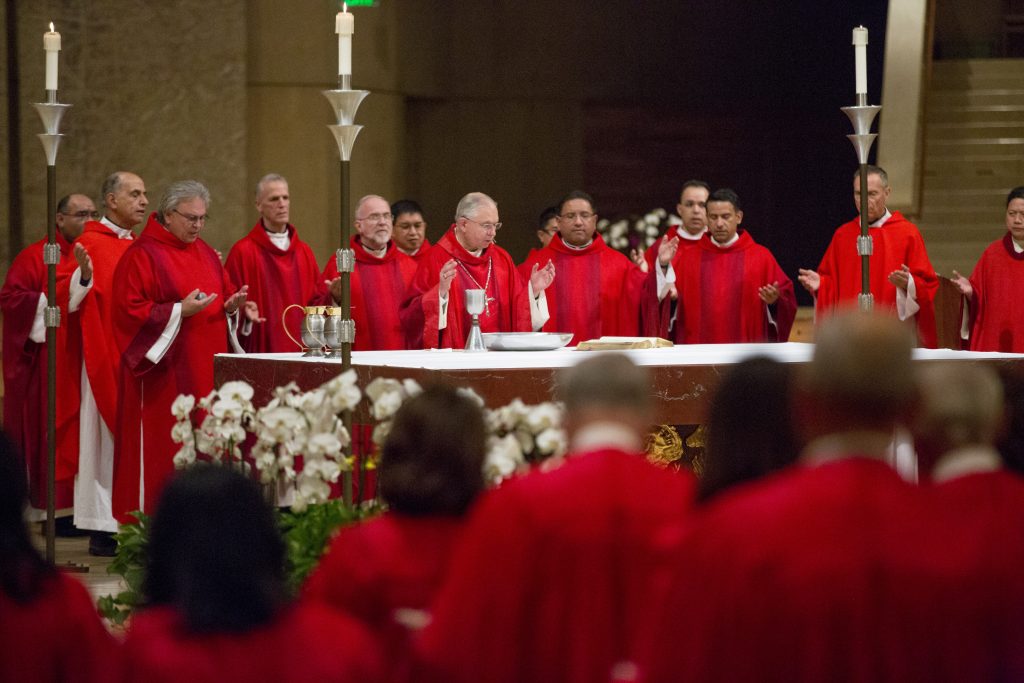St. Thomas More, the patron saint of law and public service, famously posited that “the times are never so bad but that a good man can live in them.” More’s unshakeable faith and integrity has served as inspiration to the many lawyers, judges, public officials and law faculty who gathered at the Cathedral of Our Lady of Angels Nov. 9 for the 34th annual Los Angeles Red Mass.
This particular night marked not only the beginning of not only the judicial year, but also the first full day following the unexpected election of Republican candidate Donald Trump as president-elect of the United States.
While cities across the country were in a state of unrest, with thousands protesting the surprise election, inside the cathedral was a beautiful portrait of a welcoming, inclusive environment, as the altar, the choir loft and the pews were filled with not only the best and brightest in Los Angeles law, but also members of the Equestrian Order of the Holy Sepulcher of Jerusalem, the Knights and Ladies of Peter Claver, the Knights of Columbus Color Corps and the Order of Malta.
Archbishop Jose H. Gomez celebrated the Mass in conjunction with Father James Heft, who presented the homily.
“The question isn’t ‘What’s the connection between spirituality and law?’ but rather ‘What’s the connection between spirituality and life,” said Father Heft. “Law is much more than a set of rules and principles; it’s a way of life that should touch your heart and your mind. Any time you have a group of legal people like you do at the Red Mass, you can talk to them in a way that tries to underscore important things in our lives, and focus on more than simply a list of rules, but instead on wisdom.”
Also taking pulpit during the Mass were Loyola Marymount University President Timothy Snyder, who served as the lector, and California Supreme Court Justice Tani Cantil-Sakauye, who offered riveting closing remarks in which she called for her fellow brethren to be mindful of the persistent problems that rear their heads — not only in California, but also on a global level.
“Even though we are a country and a state that happens to be on the cutting edge of civil rights, we still have intractable problems that come to the bench,” stated Cantil-Sakauye.
“We’re seeing more and more, polarization and lack of communication in the face of some our most intractable problems that desperately need leadership and resolution. And these problems, like poverty, like education, like dropout rates, like homelessness, like immigration, all come to the courts through the work of the lawyers, and through the work of my colleagues. We must bring to bear the wisdom and humility in addressing these social justice issues.”
Additionally, Cantil-Sakauye reminded the congregation that to prepare for the first term of a new president, it was appropriate, perhaps more than ever, to look to the example of St. Thomas More, who famously refused to approve King Henry VIII’s initiative to manipulate the Church’s laws to allow for a divorce, and was ultimately executed for his refusal to comply with the king’s judgment.
“I think it’s so important that we remember the work of St. Thomas More, and also, frankly, the character that built that work,” Cantil-Sakauye explained. “[He was] a person who went from the closest and highest advisor to the most secular and enslaved material leader of his times, to close friend and confidante, to treasonous prisoner to saint. And yet nothing about the work he did or the person he was changed. What changed was the world around him, and what stayed fast in that world around him and us are the values that he is remembered for.
“So how appropriate is it,” she continued, “when we have chosen public service, to be the arbiters of facts and law, to bring wisdom integrated with the facts to people who come in need, that we should remember the great works and the principles of St. Thomas More? It’s hard work; it requires us to visit every day, our hearts and our minds, to find the place where they meet for our justice. And it also can result in very unpopular decisions. But it is only by working together and bridging this polarization will we be part of the solution which we were called to be when we donned our robes and swore our oaths.”

